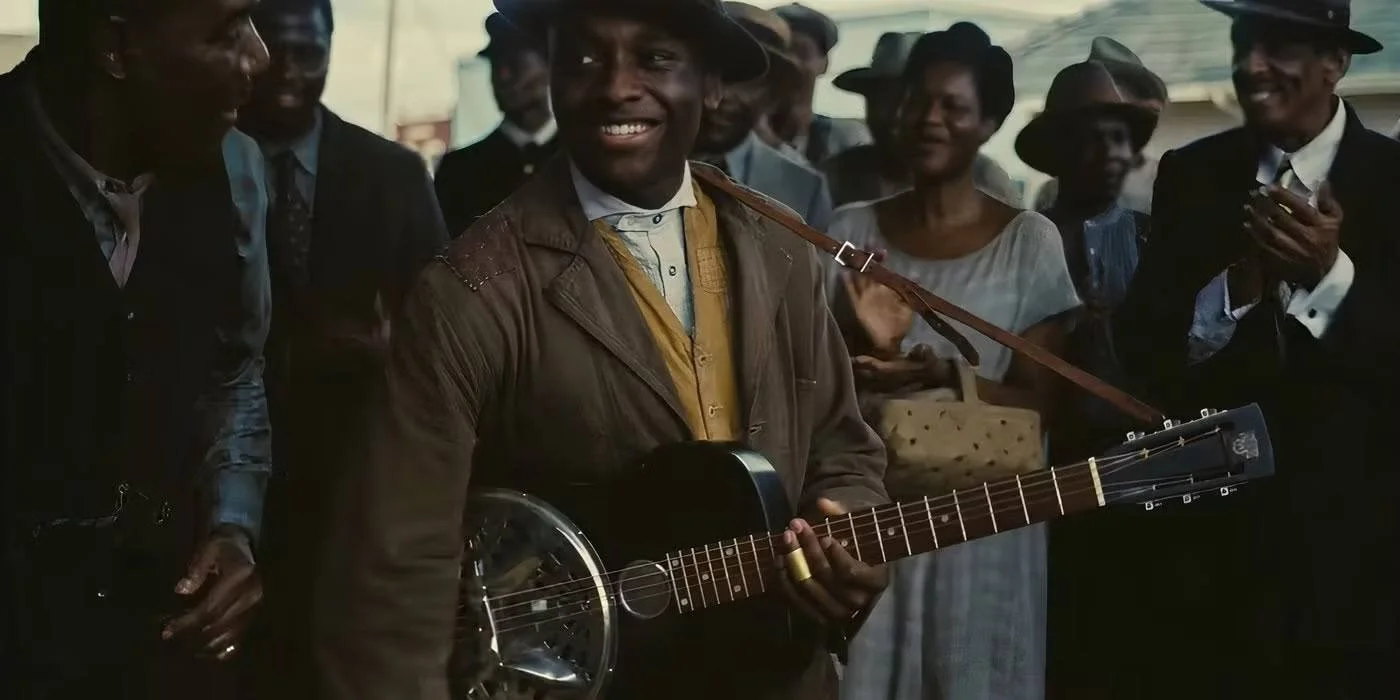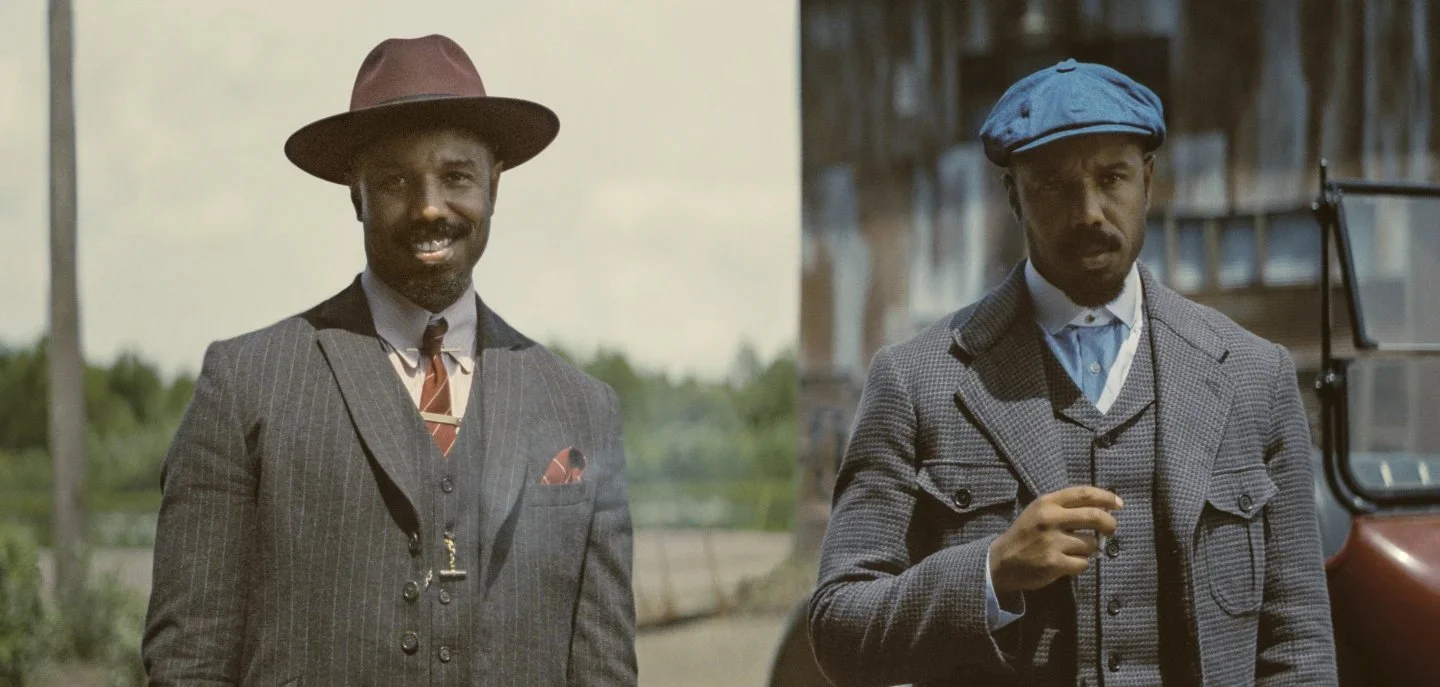The Smile is the Spell: Joy, Resistance, and Black Imagination in Sinners
The Smile as Survival
There’s a scene at the end of Sinners—Ryan Coogler’s haunting, beautiful, and subversive new film—where the blues legend Sammie, now an elder, reflects with Michael B. Jordan’s Stack on a single night in a Mississippi juke joint. “That night,” Sammie says, “I felt free.”
That line hit me like a sermon.
Not just because of what came before it—the chain gang labor of former friends, the lynching threats, the bloodsuckers in the dark literally feeding on Black bodies—but because of what it means to even feel freedom under that weight. It made me think deeply about the mantra that anchors Black Men Smile:
Black joy is revolutionary:
Because of all it must resist.
Because of all the ways it must persist.
And because of how fiercely it must insist …in order to simply exist.
The Blues as Testimony
Sammie (played by Miles Caton)
Photo – © Warner Bros.
Sinners isn’t just a horror movie. It’s not just a vampire flick draped in Southern gothic. It’s a cinematic blues—a film that moans, testifies, and conjures. It’s a spiritual lament and a praise song for Black resistance. It’s a metaphor for everything Black folks have had to survive, and a love letter to the radical act of joy (or at the very least daring to try to seek it) despite it all.
There’s a scene late in the film, subtle but unforgettable, when Stack and Delta Slim are driving past a group of Black prisoners laboring under the weight of the Southern sun. The moment is heavy, layered with silence, history, and recognition. Then Slim begins to tell a story—not just with his words, but with his voice, his rhythm, the slow, soul-deep cadence of a man who’s seen too much. He starts to hum, then moan, then breaks into an extemporaneous blues—not a rehearsed performance, but a spiritual release. It’s not just music—it’s memory. Testimony. A ritual of survival passed down through vibration.
This is what the blues has always been. A wail and a weapon. A way to carry the unspeakable without being consumed by it. It’s the sound of Black folks naming our grief without surrendering to it, telling the truth of our condition while refusing to be reduced to it. It is both cry and conjure. And in Sinners, that moment in the car reminds us that the blues isn't just a genre—it’s a theology. It’s a way of seeing the world and surviving it. And that’s why I saw Black Men Smile all over this movie. The smile in our brand name has never been about ease. It's about a refusal to be defined by our suffering even as we carry it. It’s about showing our teeth as testimony, as defiance, and as an offering. And in Sinners, the blues is that offering.
“This is what the blues has always been. A wail and a weapon. A way to carry the unspeakable without being consumed by it.”
Wooden Nickels and Worth
The film is full of symbols that speak to the conditions we may find ourselves in, but never bound to remaining. The juke joint—a space of rhythm and revelry built on land sold to Black folk by the very Klan that planned to destroy it—is a most powerful metaphor. That scene, where Black folks take their wooden nickels—false currency given in place of fair wages—and trade them in for a moment of dancing, for a song, for a night of laughter and love, captures the spirit of what it means to smile anyway.
Imagine working all day for a wooden nickel, knowing it has no value in the world outside, but still choosing to use it to buy your way into joy. That’s revolution. That’s refusal. That’s grace.
Vampires and the Blood Economy
And then there’s the vampires. Not subtle in their design, and not meant to be. They are white exploiters, cultural colonizers, emotional cannibals who come to feed off Black pain and brilliance. Stack, the twin who becomes one of them, is a tragic mirror of what happens when we internalize the hunger of those who’ve devoured us. But it’s Smoke—his brother—who represents what it means to resist the bite. Smoke’s journey, and the final promise he extracts from his vampire sibling—to leave Sammie be—is a profound metaphor for intergenerational protection, a reminder that we are our ancestors’ prayers, and sometimes their vengeance.
Even the music is resistance. Each blues riff is a form of divination. Each stomp of the foot, each moan into the mic, is a spell to ward off despair. The music in Sinners doesn’t just score the story—it is the story. It is the archive and the altar, the portal to the past and the passageway to a freer future. Just like the smile. Just like our joy.
Spirit, Sound, and Sovereignty
Annie (Wunmi Mosaku), a spiritual practitioner, brave woman, and herbalist, channels ancestral wisdom from Hoodoo and Ifá to heal, protect, and guide through spirit.
The role of Hoodoo, spiritual divination, and Black ancestral magic throughout Sinners is not accidental. It’s a reclamation. In a world that criminalized our spiritual practices, our ways of protecting and empowering ourselves, Sinners shows what happens when we root our resistance in that ancestral wisdom. The rituals performed aren’t just about survival—they’re about sovereignty.
And that’s why, even in the midst of horror—KKK plots, vampire attacks, economic exploitation, unbearable memories of loss (of a child)—there’s love. There’s sex. There’s dancing. There’s joy. There’s that line again: That night, I felt free.
It reminds me that Black joy isn’t about ignoring pain. It’s about transforming it. About insisting on beauty even when the world denies us breath. About reaching for each other in the dark, and creating light between us.
Why Black Men Smile
At Black Men Smile, we say that Black joy is revolutionary. Because it is. Because every time a Black man laughs with his full body, with his whole soul, he is disrupting the narratives that say we are only ever angry or broken or dangerous. Every time we love, when we dance, when we create, when we smile—we are building a world outside of theirs.
Sinners understands that. It sings it. And like the blues, it teaches us that even in the belly of the beast, there is song. Even in the shadow of death, there is rhythm. And even in a world that tries to steal our breath, we will laugh. We will love. We will rise.
Because we must. Because we always have.
Because joy—that stubborn, shining, rebellious joy—is our birthright.
And that’s why Black men smile.
Carlton Mackey
Creator of Black Men Smile






